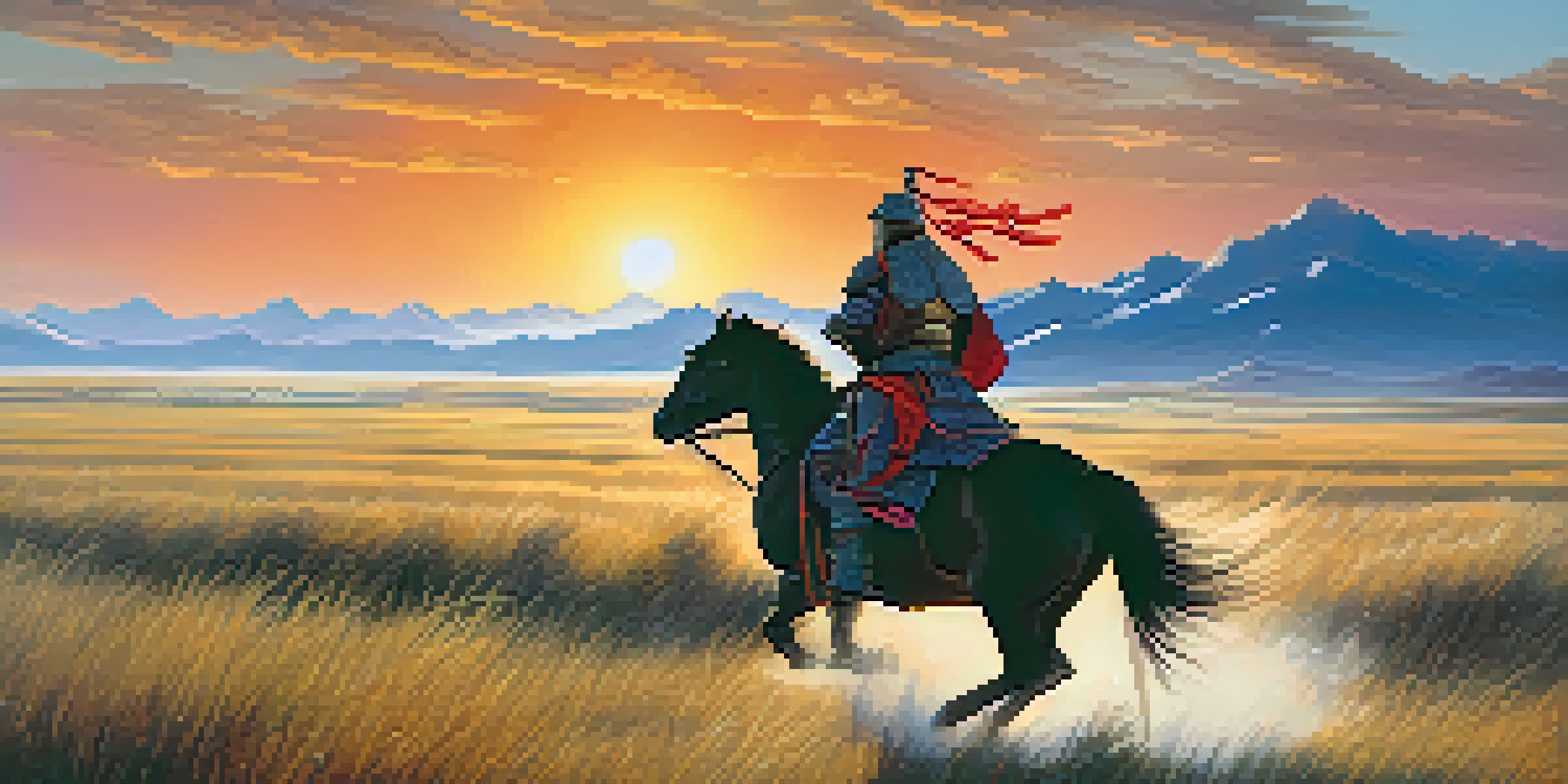Genghis Khan: The Warrior's Guide to Self Defense Principles

The Legacy of Genghis Khan and His Warfare Tactics
Genghis Khan, the founder of the Mongol Empire, is renowned for his unmatched military strategies. His ability to adapt and innovate on the battlefield not only led to vast conquests but also established principles that can be applied beyond warfare. Understanding his tactics gives us insights into effective self-defense strategies applicable in everyday situations.
The greatest victory is that which requires no battle.
Khan emphasized the importance of mobility and speed, often outmaneuvering opponents before they could react. This principle can be translated into self-defense as the ability to remain agile and ready to respond to threats quickly. When faced with danger, being light on your feet can be the difference between evasion and confrontation.
Moreover, Genghis Khan’s use of psychological warfare—intimidating enemies through reputation and strategic deception—reminds us that self-defense isn’t just about physical prowess. It’s also about mindset and the ability to present oneself confidently, potentially deterring aggressors before a conflict escalates.
The Importance of Awareness and Observation
One of the key tenets of Genghis Khan's success was his acute awareness of his surroundings. He understood that being attuned to the environment and the behavior of others was crucial for survival. In self-defense, this translates into situational awareness—being mindful of who and what is around you can help you anticipate potential threats.

For instance, just as Khan studied enemy formations and movements, individuals today should observe body language and social cues in various settings. This awareness allows you to identify possible danger before it escalates, giving you the chance to remove yourself from risky situations.
Adaptability is Key to Safety
Genghis Khan's ability to modify tactics based on circumstances teaches us the importance of being flexible in self-defense situations.
Additionally, cultivating awareness is about more than just observing; it also involves trusting your instincts. Just as Genghis Khan relied on his intuition, so too should we listen to our gut feelings. If something feels off, it's often best to err on the side of caution.
The Art of Adaptability in High-Pressure Situations
Genghis Khan's ability to adapt to different combat scenarios exemplifies the value of flexibility in self-defense. He often modified his tactics based on the strengths and weaknesses of his opponents. This principle is vital for anyone looking to defend themselves: the best response can vary significantly depending on the situation.
In the midst of chaos, there is also opportunity.
In a self-defense context, adaptability might mean switching your approach based on the number of attackers, the environment, or even your own physical limitations. For example, if faced with multiple aggressors, finding an escape route may be more prudent than engaging directly.
Moreover, adaptability fosters resilience. Just as Khan’s forces regrouped and recalibrated after setbacks, individuals must learn to bounce back from unexpected challenges in self-defense. Embracing change and being open to new strategies can enhance your ability to handle threatening scenarios.
Utilizing the Element of Surprise
Khan was a master of surprise, often launching unexpected attacks that caught his enemies off guard. This element of surprise can be a powerful tool in self-defense as well. The goal is to create an advantage that disrupts an attacker’s expectations and allows for effective counteraction.
In practical terms, this might mean using unexpected tactics to escape a dangerous situation. For example, if confronted, a sudden loud noise or an unexpected movement can distract or confuse an aggressor long enough for you to get away.
Awareness Prevents Threats
Cultivating situational awareness, like Genghis Khan's keen observations, can help individuals identify potential dangers before they escalate.
Surprise isn’t just about physical actions; it can also come from a shift in demeanor. By exuding confidence and calmness, you may unsettle a potential attacker, making them rethink their decision to confront you. This psychological aspect of surprise is often overlooked but can be equally effective.
The Power of Teamwork and Community Support
Genghis Khan understood the importance of unity and teamwork among his troops. This principle can translate into the realm of self-defense as well. Having a support system or allies can significantly enhance one's ability to remain safe in threatening situations.
In modern self-defense, this could mean staying in groups, especially in unfamiliar or potentially dangerous settings. There’s strength in numbers, and being with others can deter potential aggressors from targeting you. Just as Khan relied on his loyal warriors, surrounding yourself with trustworthy friends can create a protective network.
Moreover, community support extends to sharing knowledge and resources. Just as Khan’s strategies were communicated among his ranks, individuals today can benefit from learning self-defense techniques together. Engaging in group classes or workshops fosters camaraderie and equips everyone with valuable skills.
Learning from Failure and Adapting Strategies
Genghis Khan faced numerous challenges and setbacks throughout his campaigns, yet he always learned from failures. This resilience is a crucial aspect of self-defense; one must recognize that not every situation will go as planned. Understanding this reality allows individuals to adapt their strategies and improve over time.
In self-defense training, practitioners often encounter various techniques that may not work in every scenario. The key is to review these experiences, determine what went wrong, and adjust accordingly. This reflective process not only enhances skills but also builds confidence in one’s ability to handle future threats.
Teamwork Enhances Security
Just as Khan relied on the strength of his troops, having a support network is crucial for personal safety in challenging environments.
Moreover, embracing failure as a learning opportunity fosters a growth mindset. Just as Khan evolved his tactics through experience, so can individuals approach self-defense with a mindset of continuous improvement. Acknowledging mistakes is a step toward mastery and preparedness.
Embracing a Warrior Mindset for Everyday Life
Genghis Khan’s life exemplified a warrior mindset, characterized by determination, discipline, and resilience. Adopting this mindset can profoundly impact how individuals approach challenges in daily life, including self-defense. It's about cultivating a mental state that prioritizes preparedness and confidence.
In practical terms, a warrior mindset means being proactive—training regularly, staying fit, and continually learning new skills. It’s not just about physical readiness; it’s also about mental fortitude. Just as Khan prepared his troops for various scenarios, you too can prepare yourself for potential encounters.

Additionally, this mindset encourages a sense of responsibility. Embracing the idea that one can influence their safety and well-being empowers individuals to take action rather than remain passive. By embodying a warrior spirit, you cultivate a proactive approach to life, enhancing both your self-defense capabilities and overall confidence.